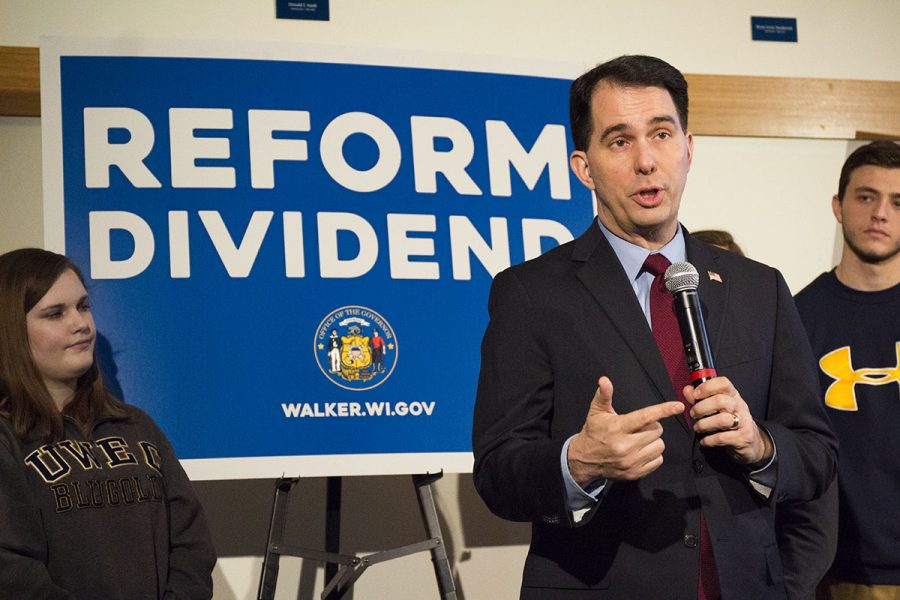Gov. Scott Walker plans to increase education funding
Budget proposal connects education and the workforce with long-term plans to bolster the state’s economy and school systems
More stories from Hillary Smith
Photo by Kendall Ruchti
On Feb. 8 Gov. Scott Walker outlined a plane where more than $100 million in new funding would be committed to the UW System.
Gov. Scott Walker delivered his 2017 budget address Wednesday afternoon, emphasizing the importance of making education accessible and affordable so it can contribute to future economic growth.
“Our budget … is not about the past,” Walker said. “It’s about looking forward to addressing the workforce needs of the future.”
Walker also stopped on Tuesday at UW-Eau Claire to present the 2017-19 budget proposal to a small group of students, faculty and reporters in the Chancellor’s Room of Davies Student Center.
The proposed budget will alter Wisconsin’s approach to funding public education; specifically, Walker outlined a plan where more than $100 million in new funding would be committed to the UW System budget. In the 2015-17 budget, the UW System lost $250 million in funding. The new higher education budget will increase funding for technical colleges, maintain the tuition freeze and reward universities based on performance.
Growing the workforce through the expansion of education and experience opportunities are the main objectives of this budget proposal, which Walker said will be achieved with added focus at all levels of education, as well as changes in welfare and other benefit programs.
“The challenge now and for the foreseeable future is how do we make sure there are more quality people ready and able to enter the workforce,” Walker said.
Republicans froze UW System tuition in the 2013-15 budget, which was extended into the 2015-17 budget as well and will remain frozen in the first year of the new budget. The state will then reduce tuition by 5 percent in the new budget, which translates to about $360 per student a year. This decrease will be funded using a budgeted $35 million in addition to the $100 million and would not be reliant on cuts by the university.
Lee Peterson, a sophomore at Eau Claire and a member of the College Republicans, attended the event and said he supported Walker’s proposal all-around, particularly the steps to make tuition more affordable.
“That is going to personally affect me,” Peterson said. “I know it’s going to personally affect all my other classmates. I think it’s awesome what he’s doing … I’m super excited about the money that is coming back to the students.”
Kyle Theiler, a first-year healthcare administration student, also spoke in support of Walker’s budget. The price of tuition is “ridiculous” in this day-and-age, he said, and the moves the state is making to address that are encouraging.
“It’s also reassuring to see that it’s not just democratic leaders that are trying to focus more on education and trying to lower the amount of money that kids have to spend on college,” Theiler said.
Chancellor James C. Schmidt also reacted positively to Walker’s proposal. Although he said he was still waiting for more details on the plan, he was pleased with the direction the state was taking.
“It’s a breath of fresh air,” Schmidt said. “It is welcomed news to not only the hard working faculty and staff of the university, but for our students, because connected to those dollars are very specific opportunities for students.”
In return, Schmidt said this ends up benefiting the state economically when Wisconsin graduates are then sent into the state’s workforce to build communities and contribute to innovative ideas.
Not everyone reacted to Walker’s budget as positively.
Hours after Walker came to campus, the documentary “Starving the Beast” was shown at the Woodland Theater in Davies. The film examines the struggle between higher education and the state. In the post-watch discussion, Walker’s budget was acknowledged.
Although most agreed any investment into education is positive, a few people in the crowd of about 40 criticized Walker for past actions, saying this financing does not come close to making up for how he “gutted” education in the past.
Daniel Strouthes is an anthropology professor at UW-Eau Claire and is president of the local American Federation of Teachers (AFT) 648. He said the budget increase would be positive but fails to erase deficits caused by the legislature and governor. He also disagreed with the budget’s emphasis on college serving as a springboard to the workforce.
“It’s kind of unfortunate that so many people in this state see the university education as just a ticket to a better job, to a better career and that’s not what it’s for,” Strouthes said. “It’s for making life more interesting, it’s for making life more enjoyable.”
For more information on the biennial budget, visit walker.wi.gov.

